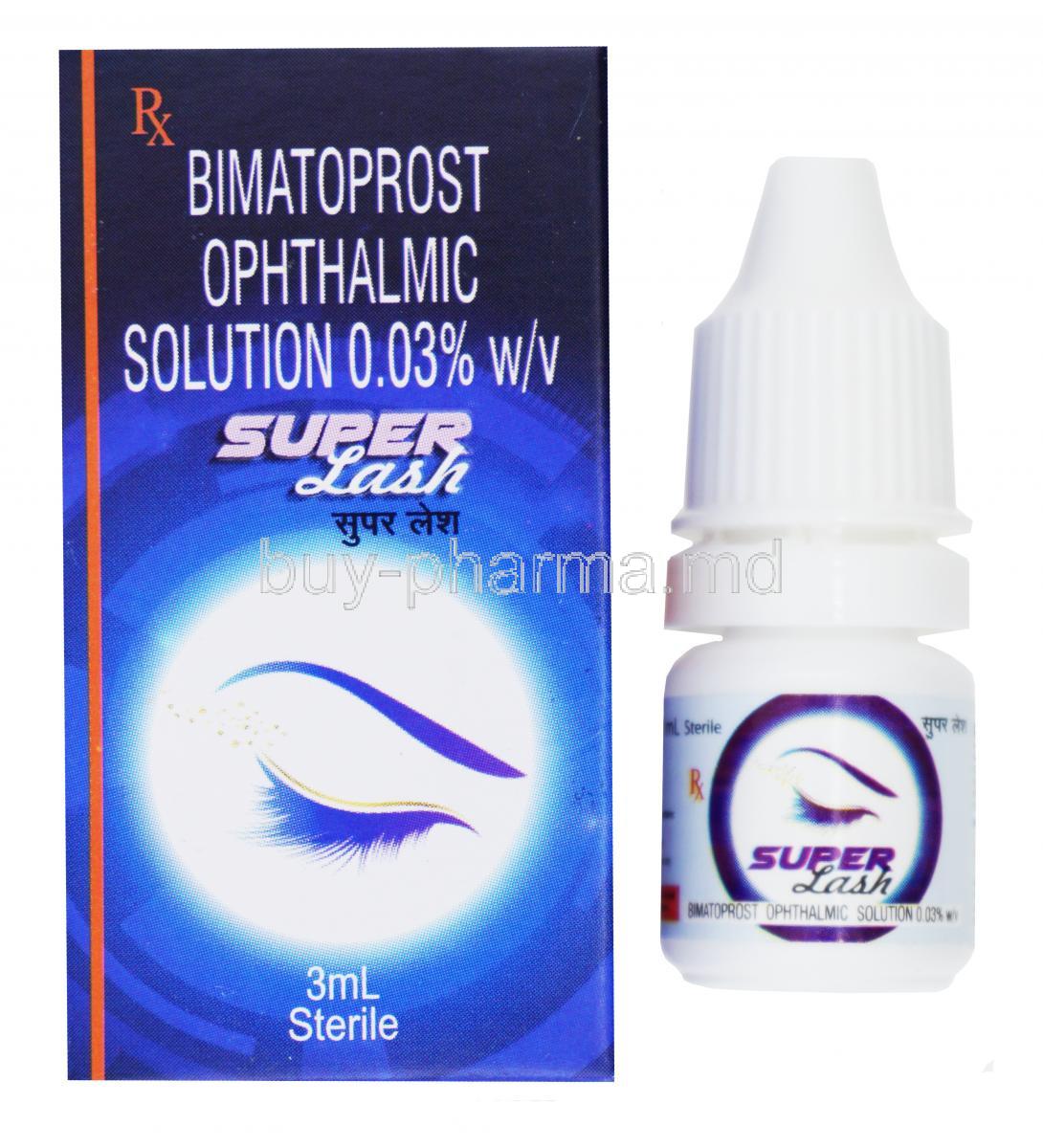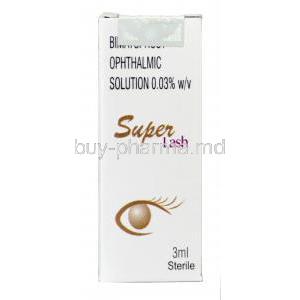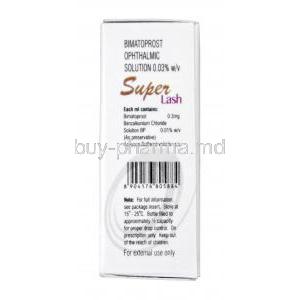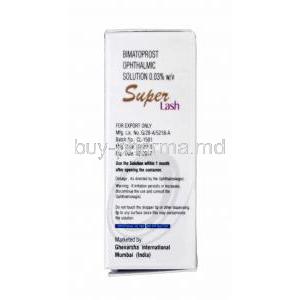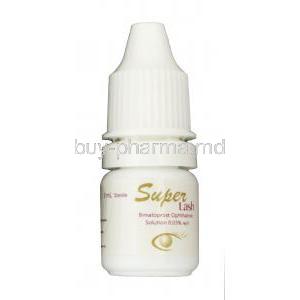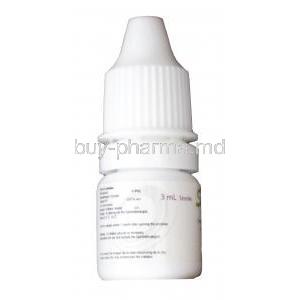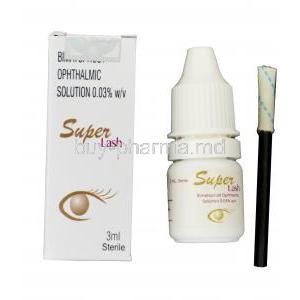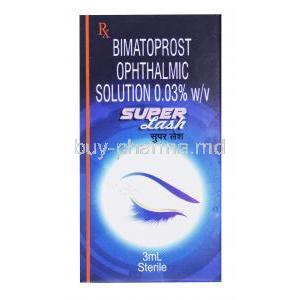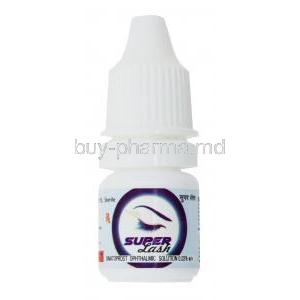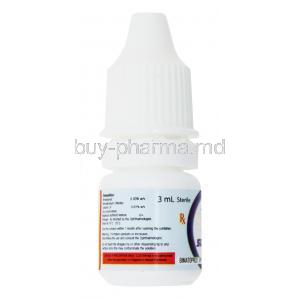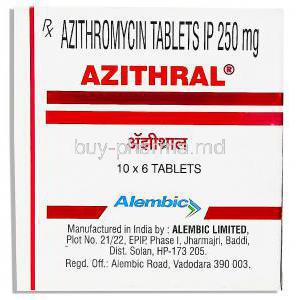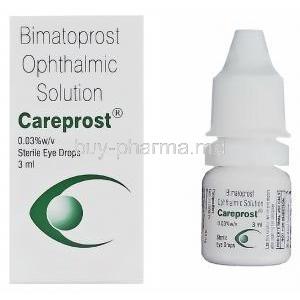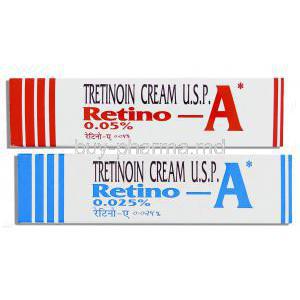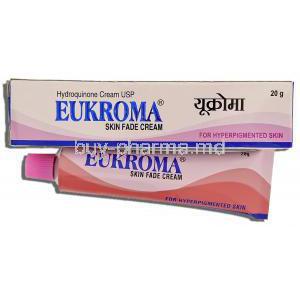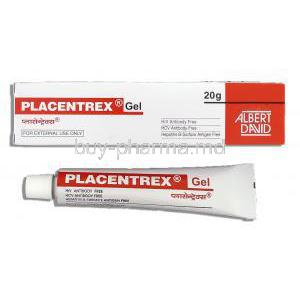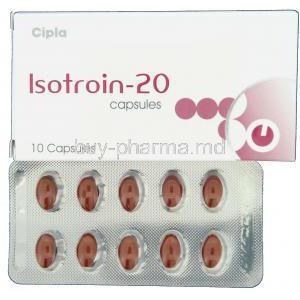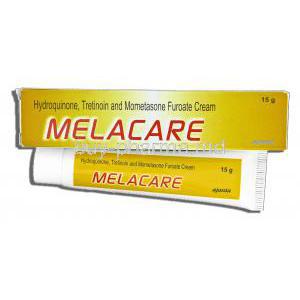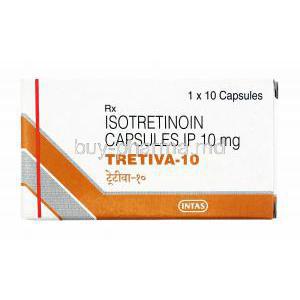1. Introduction to Super Lash (Bimatoprost Eyedrops)
Overview of Super Lash: Brand Identity and Classification
Super Lash is a clinically formulated ophthalmic solution containing bimatoprost 0.03%, classified as a prostamide analog. It is available under various brand names but is best known for its dual function—medical management of ocular hypertension and cosmetic enhancement of eyelash growth.
Historical Background and Development of Bimatoprost
Bimatoprost was initially developed as a therapeutic agent to lower intraocular pressure in patients with glaucoma. However, during clinical use, an unexpected side effect—eyelash growth—sparked cosmetic interest, leading to its rebranding for aesthetic applications.
Approved Medical Indications and Market Availability
Super Lash is indicated for:
- Primary open-angle glaucoma
- Ocular hypertension
In addition, it has gained widespread use in the beauty industry for treating eyelash hypotrichosis. The product is widely available across international markets, both online and through prescription.
Prescription Status and Regulatory Approvals
While bimatoprost-based products for glaucoma require a prescription in many regions, cosmetic formulations may be available over the counter in certain countries. It is FDA-approved for medical use under the brand name Lumigan and for cosmetic use as Latisse.
2. Composition and Pharmaceutical Characteristics
Active Ingredient: Bimatoprost 0.03%
Each milliliter of Super Lash contains 0.3 mg of bimatoprost, a synthetic prostamide that mimics the effects of naturally occurring prostaglandins.
Inactive Components and Preservative Agents
The formulation includes:
- Benzalkonium chloride (preservative)
- Sodium chloride
- Phosphate buffers
- Purified water
Physical Properties: pH, Osmolarity, Viscosity
Super Lash maintains a physiological pH of approximately 6.8–7.8 and is isotonic to ensure comfort upon instillation. Its low viscosity allows easy ocular penetration and spread.
Formulation Type: Ophthalmic Solution
The solution is sterile, aqueous, and designed for topical ophthalmic use. It comes in dropper bottles with a tamper-evident seal.
3. Therapeutic Uses of Super Lash
3.1 Approved Medical Uses
Reduction of Intraocular Pressure (IOP) in:
- Primary Open-Angle Glaucoma: Reduces IOP by enhancing aqueous humor outflow.
- Ocular Hypertension: Used as monotherapy or adjunctive treatment when other IOP-lowering medications are insufficient.
3.2 Cosmetic and Off-Label Uses
Eyelash Hypotrichosis
Enhances eyelash length, thickness, and darkness by prolonging the growth (anagen) phase.
Eyebrow Thickening and Regrowth
Applied off-label to sparse eyebrows, promoting follicular stimulation and improved density.
Potential Off-Label Dermatologic and Ophthalmologic Applications
Emerging use in aesthetic dermatology for stimulating hair follicles in localized alopecia. Not officially approved, but under investigation.
4. Mechanism of Action: How Bimatoprost Works
Pharmacodynamics: Prostamide Analog Activity
Bimatoprost mimics endogenous prostamides, binding to prostaglandin receptors and enhancing aqueous humor drainage.
Effect on Aqueous Humor Outflow
Facilitates outflow through both:
- Uveoscleral pathway (primary)
- Trabecular meshwork (secondary)
Mechanism of Eyelash Growth Stimulation
Stimulates follicular cells during the anagen phase, increasing hair shaft length and melanin content, thereby enhancing visibility and volume.
5. Dosage and Administration Guidelines
5.1 For Glaucoma and Ocular Hypertension
Recommended Dosing Schedule
One drop in the affected eye(s) once daily in the evening.
Proper Instillation Technique
- Wash hands before use
- Avoid touching the dropper tip
- Apply drop into conjunctival sac
- Gently close the eye for 1–2 minutes
Duration of Therapy and Monitoring
Regular monitoring of intraocular pressure is advised. Long-term use should be evaluated for effectiveness and side effects.
5.2 For Eyelash Growth (Cosmetic Use)
Application Method
Apply a small amount with a sterile applicator to the upper eyelid margin once daily.
Frequency and Expected Onset of Results
Visible results may appear within 4 to 8 weeks, with full effect around 12–16 weeks.
Maintenance and Discontinuation
Discontinuing use typically results in gradual return to baseline eyelash condition.
6. Side Effects of Super Lash
6.1 Common Side Effects
- Conjunctival hyperemia (eye redness)
- Ocular pruritus (itching)
- Dryness, stinging, or burning sensation
6.2 Less Common and Serious Adverse Reactions
- Eyelid skin darkening
- Iris pigmentation changes (especially in hazel or green eyes)
- Macular edema, particularly in pseudophakic patients
- Visual disturbances, eye pain, or headache
- Rare systemic reactions such as dizziness or respiratory effects
7. Important Precautions Before and During Use
- Monitor for iris and periocular pigmentation, particularly with long-term use
- Use with caution in patients with a history of uveitis or macular edema
- Apply hygienically to prevent microbial contamination
- Remove contact lenses before application; wait 15 minutes before reinserting
8. Contraindications and When Not to Use Super Lash
- Hypersensitivity to bimatoprost or any of the formulation ingredients
- Ocular conditions such as active intraocular inflammation or infections
- History of macular edema, particularly in aphakic patients
9. Special Considerations and Careful Administration
9.1 Administration to Elderly Patients
Elderly individuals often present with concurrent systemic conditions that may necessitate careful adjustment of ocular therapy. Super Lash should be used with heightened vigilance in patients with cardiovascular disease, diabetes, or a history of ocular surgery.
Due to age-related thinning of the conjunctival and corneal surfaces, there may be increased sensitivity or susceptibility to irritation. Tear film instability is also common in this population, potentially amplifying discomfort or dry eye symptoms. Regular ophthalmic evaluations are essential to tailor ongoing treatment.
9.2 Use in Pregnant Women
Animal reproductive studies have indicated potential fetal harm at high systemic exposures. However, controlled data in pregnant humans is lacking. Bimatoprost is classified as a Category C drug by the FDA, suggesting risk cannot be ruled out.
For patients requiring glaucoma treatment during pregnancy, a comprehensive risk-benefit analysis is imperative. If the therapeutic gain outweighs fetal risk, and alternative agents are unsuitable, Super Lash may be considered with close monitoring.
9.3 Use During Lactation
The excretion of bimatoprost in human breast milk has not been conclusively determined. Given its systemic absorption—albeit minimal—it is advisable to avoid use during breastfeeding unless the medication is deemed essential.
In cases where Super Lash must be used, consider advising temporary cessation of breastfeeding or monitor the infant closely for adverse reactions.
9.4 Pediatric Use and Safety Profile
The safety and efficacy of bimatoprost ophthalmic solution in individuals under 16 years of age have not been established. Due to limited clinical data, its use in children should be avoided except in rare, monitored situations such as congenital glaucoma resistant to other therapies.
Careful ophthalmologic supervision and specialist consultation are mandatory when considering off-label pediatric administration.
10. Drug Interactions and Compounding Risks
- Prostaglandin Analogs: Concomitant use with other prostaglandin analogs (e.g., latanoprost, travoprost) may reduce intraocular pressure-lowering efficacy and increase the risk of ocular side effects.
- IOP-Lowering Medications: May be used with beta-blockers, carbonic anhydrase inhibitors, or alpha agonists. However, additive effects on ocular tissues should be monitored.
- Topical Corticosteroids: Long-term concurrent use may increase the risk of intraocular inflammation, elevated IOP, or macular edema.
- Preservative Sensitivity: Users of multiple preserved eye drops, particularly those with benzalkonium chloride, are at risk for ocular surface toxicity or allergy.
11. Storage Conditions and Shelf Life
Recommended Temperature and Light Exposure Guidelines
Store Super Lash at controlled room temperature between 2°C and 25°C (36°F to 77°F). Protect from direct sunlight and excessive heat. Avoid freezing the solution.
Importance of Cap Closure and Dropper Hygiene
Always secure the cap tightly after each use to maintain sterility and prevent evaporation or contamination. Ensure the dropper tip does not contact any surfaces, including the eye or fingers.
Expiry and Stability After Opening
Once opened, the bottle should be used within 4 weeks to ensure efficacy and microbial safety. Do not use beyond the labeled expiration date, even if the bottle appears full.
12. Handling Precautions and Patient Safety Tips
- Dropper Hygiene: Never touch the dropper tip to any surface. Keep the bottle tightly closed when not in use.
- Single-User Application: Sharing eye drops can lead to serious cross-contamination or ocular infections. The product is strictly for individual use.
- Proper Disposal: Expired or unused Super Lash should be discarded in accordance with local pharmaceutical waste guidelines.
- Missed Doses: If a dose is missed, apply it as soon as possible. If it is near the time for the next dose, skip the missed dose—do not double the application.
13. Management of Overdose and Accidental Ingestion
Symptoms of Ocular or Systemic Overdose
While ocular overdose is rare, symptoms may include excessive tearing, conjunctival redness, or ocular irritation. In case of accidental oral ingestion, symptoms may include nausea, dizziness, or hypotension due to systemic absorption.
Immediate Steps in Case of Overdose
Flush eyes with sterile saline or water if over-application causes irritation. If ingestion is suspected, seek emergency medical attention immediately. Provide supportive measures as required.
Medical Management and Monitoring Protocols
There is no known antidote for bimatoprost overdose. Treatment is primarily supportive, including observation of cardiovascular and respiratory parameters if systemic effects are present.
14. Summary of Clinical Monitoring and Follow-up
Recommended Ophthalmologic Evaluations
Patients using Super Lash for medical purposes should undergo regular intraocular pressure assessments, optic nerve examinations, and visual field tests. Cosmetic users should be monitored for periorbital pigmentation or eyelash abnormalities.
Duration of Treatment and Reevaluation Intervals
For glaucoma or ocular hypertension, long-term therapy is often required. Evaluations should occur every 3–6 months based on individual response. Cosmetic users may be reassessed every 2–3 months to monitor for efficacy and adverse effects.
Managing Long-Term Cosmetic Users Versus Medical Users
Medical users should prioritize visual preservation and IOP control, while cosmetic users must be counseled on the risks of discontinuation, pigmentation changes, and unintended effects. Differentiated follow-up schedules and documentation are advised for both groups.
Super Lash, Bimatoprost Eyedrops FAQ
- What is super lash?
- Is it safe to use bimatoprost for eyelash growth?
- How long does bimatoprost take to grow eyelashes?
- What are the risks of bimatoprost?
- When is the best time to use bimatoprost?
- How long can you use bimatoprost?
- Can you buy bimatoprost over the counter?
- Will bimatoprost grow eyebrows?
- Is bimatoprost safe for eyelashes?
- How often should I apply bimatoprost for eyelash growth?
- Why is bimatoprost used at night?
- Who should not use bimatoprost?
- What is super lash?
- Is it safe to use bimatoprost for eyelash growth?
- How long does bimatoprost take to grow eyelashes?
- When is the best time to use bimatoprost?
- How long can you use bimatoprost?
- Can you buy bimatoprost over the counter?
- Will bimatoprost grow eyebrows?
- Is bimatoprost safe for eyelashes?
- Why is bimatoprost used at night?
What is super lash?
This process helps to lengthen and thicken your eyelashes and typically results in lashes for individuals.
Is it safe to use bimatoprost for eyelash growth?
When you apply bimatoprost to the base of your eyelashes at the edge of your eyelid, it's usually safe.
How long does bimatoprost take to grow eyelashes?
16 weeks
What are the risks of bimatoprost?
Conjunctival hyperemia, Eye pruritus and erythema, Blepharitis, Conjunctivitis, Dry eye syndrome
When is the best time to use bimatoprost?
Evening
How long can you use bimatoprost?
Many individuals have been using bimatoprost for a period without experiencing any adverse reactions.
Can you buy bimatoprost over the counter?
Yes
Will bimatoprost grow eyebrows?
Yes
Is bimatoprost safe for eyelashes?
Yes
How often should I apply bimatoprost for eyelash growth?
Once a day
Why is bimatoprost used at night?
Taking the medication at night can be beneficial in optimizing its effectiveness in reducing pressure (pressure inside the eye) when pressure tends to increase naturally in individuals with glaucoma.
Who should not use bimatoprost?
Teenagers under the age of 16 years
What is super lash?
This process guarantees that your eyelashes will grow longer and thicker, and for individuals, it also results in eyelashes.
Is it safe to use bimatoprost for eyelash growth?
Applying bimatoprost to the lash line at the edge of the eyelid is usually considered safe, although it may cause side effects.
How long does bimatoprost take to grow eyelashes?
16 weeks
When is the best time to use bimatoprost?
Evening
How long can you use bimatoprost?
Most individuals have been using bimatoprost for periods without experiencing any adverse reactions.
Can you buy bimatoprost over the counter?
Yes
Will bimatoprost grow eyebrows?
Yes
Is bimatoprost safe for eyelashes?
Yes
Why is bimatoprost used at night?
At night, administering the medication can optimize its effectiveness in reducing pressure ( known as IOP), especially during the hours when pressure tends to increase naturally in individuals with glaucoma.

